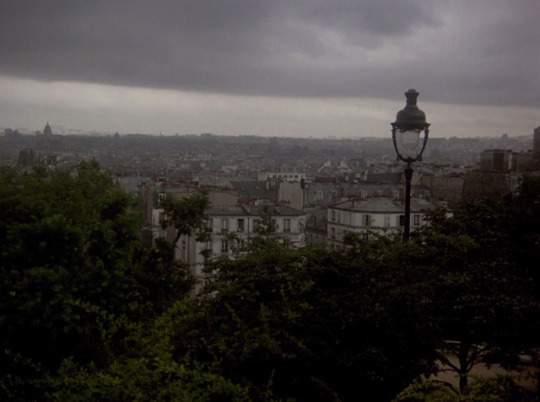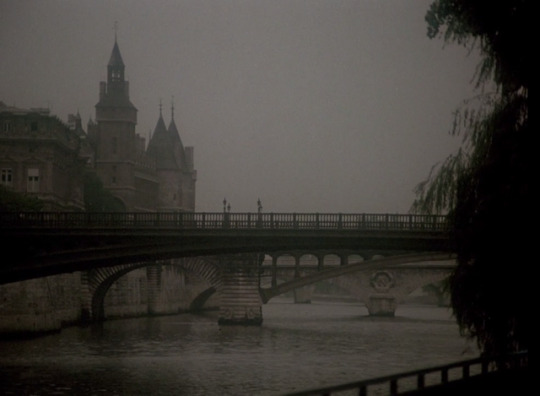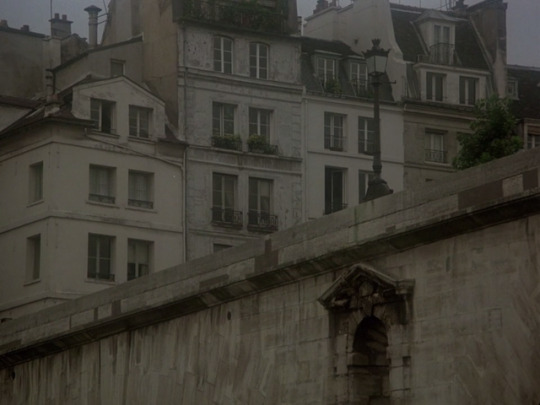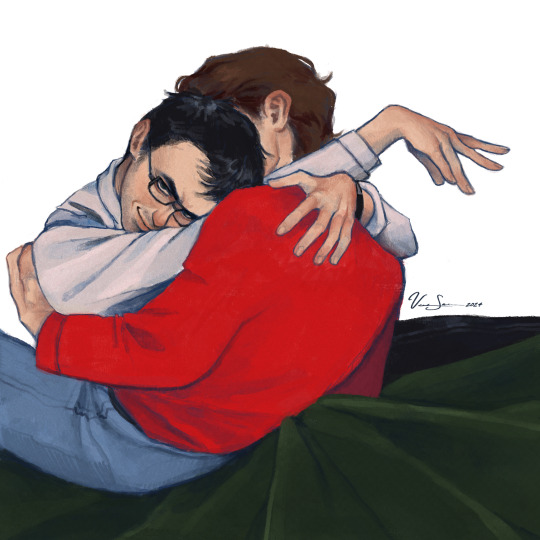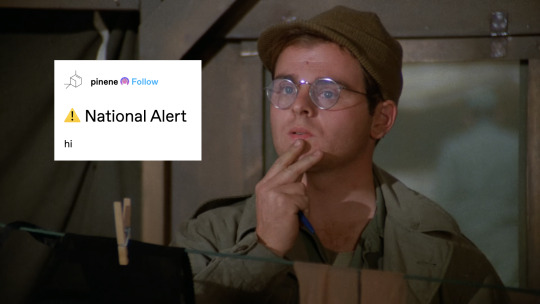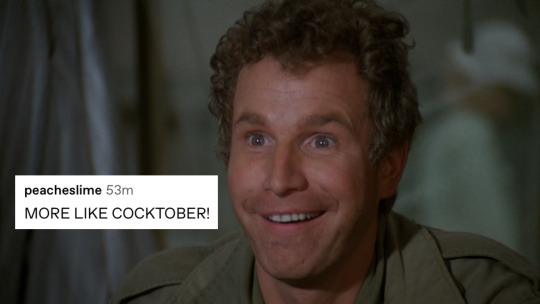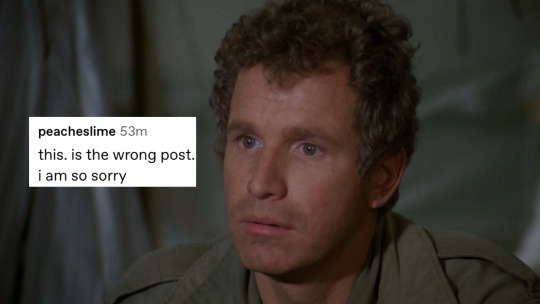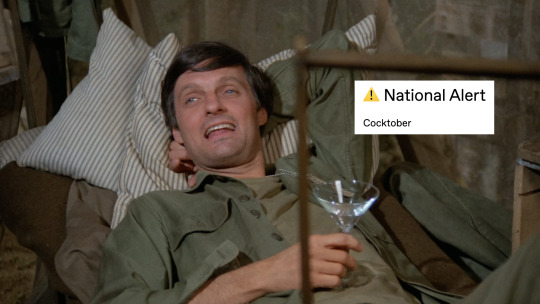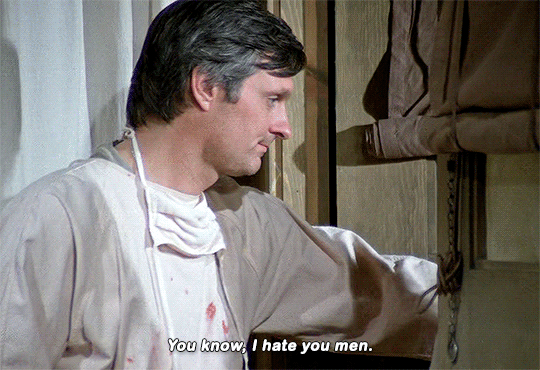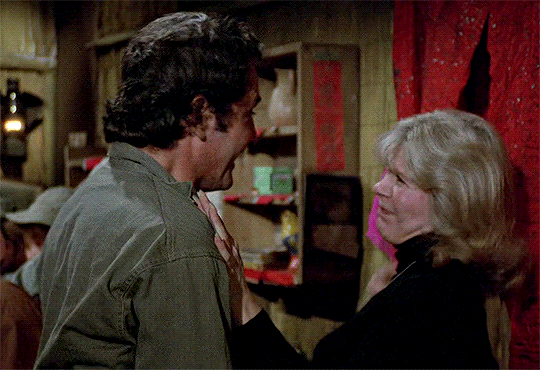Multifandom leonel she/her - oldies, films, and silly homosexual couples ♪ expect lots of shitpost, reposts and edits.Be nice on here y’all ! 🌷
Don't wanna be here? Send us removal request.
Text

Jeeves&Wooster
507 notes
·
View notes
Text
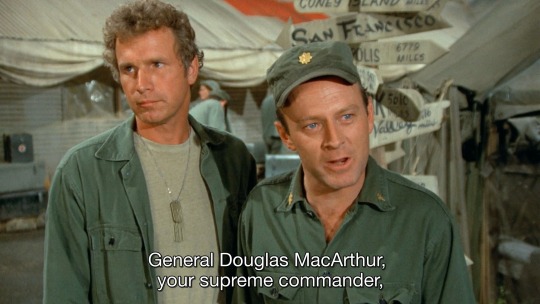
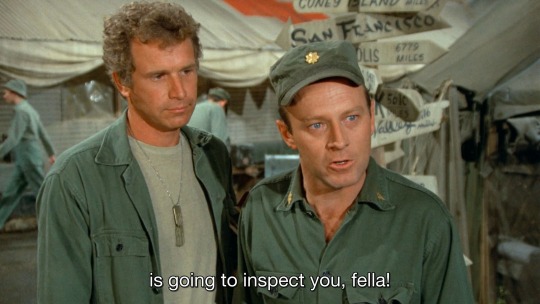
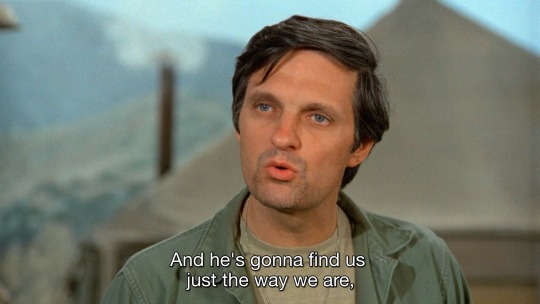
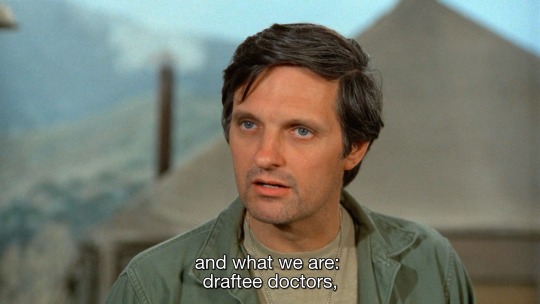
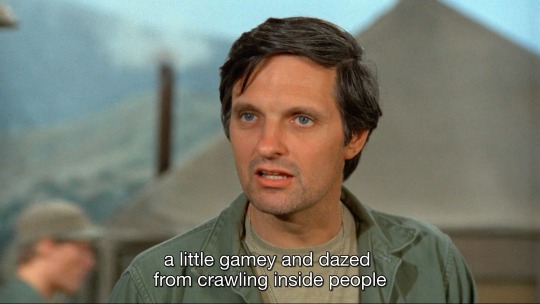
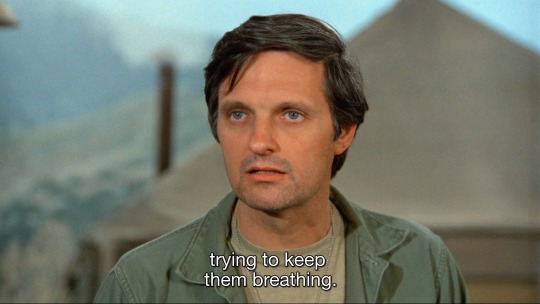
Turn it upppppp 🔊🔊🔊🔊
689 notes
·
View notes
Text
hard to watch stuff that’s not mash. what do u mean there’s no hawkeye in this.
845 notes
·
View notes
Text
the real antidote to the problem of "everyone is beautiful and no one is horny" is watching old horny shows like mash. nothing but perfectly normal-looking, homely, average people in that show who hook up with each other or unseen partners on a regular basis. hawkeye is absolutely drowning in sex and the man has such a bizarre mismatched set of randomly strong and weak facial features on a noodle body with dogshit posture. and it's GREAT. you can't tell how soft his jawline is because there's always a woman kissing his neck and blocking the camera. i know i riff on people saying they want to fuck mulcahy until he has a religious epiphany but as a butch lesbian with that exact face shape it's been so healing to be like. ohhhh ok so sexuality and attractiveness isn't just limited to the perfect beautiful poreless people on netflix. i understand now
26K notes
·
View notes
Text
MASH really is the ultimate "love didn't save them but it was there and it mattered" media to me, because love couldn't save Hawkeye's sanity or BJ's temper or Margaret's marriage or Charles' music or Henry or anyone else. Nothing can save them. But also the love was there. It was there in the squabbles and bicker and the still and getting spareribs from Chicago and the red party and BJ's wedding anniversary and taking care of sophie and Radar's pets and the Life magazine with scenic pictures from Maine. It was even in drugging CIA men and unnecessary appendectomies and barging into peace talks and blowing up tongue depressor towers. And the love mattered so much because it gave them a semblance of living and not just surviving, a life to fight against war and destruction of life. It was the one thing that kept them human despite it all. I truly think nothing mattered more than love in MASH.
2K notes
·
View notes
Photo

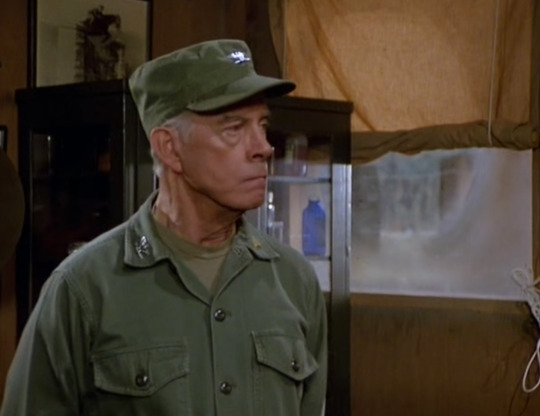

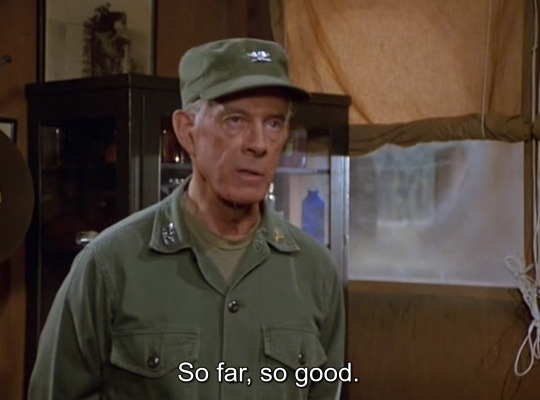
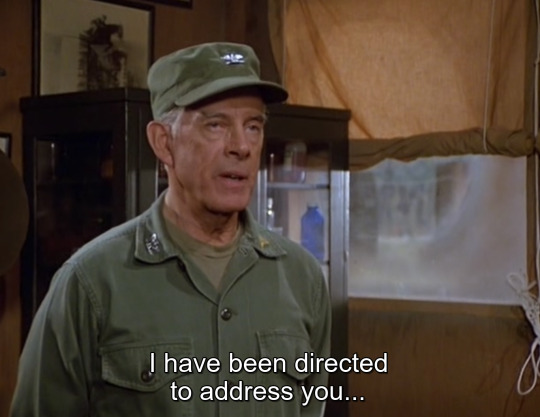

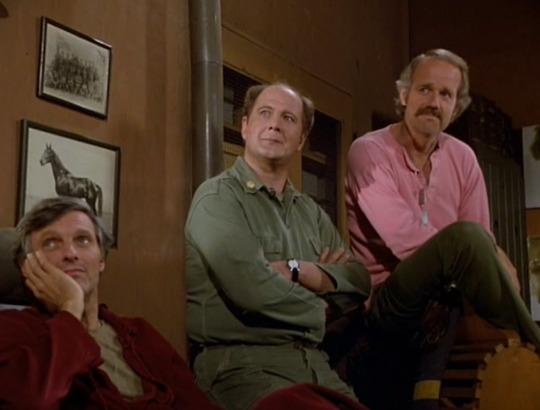
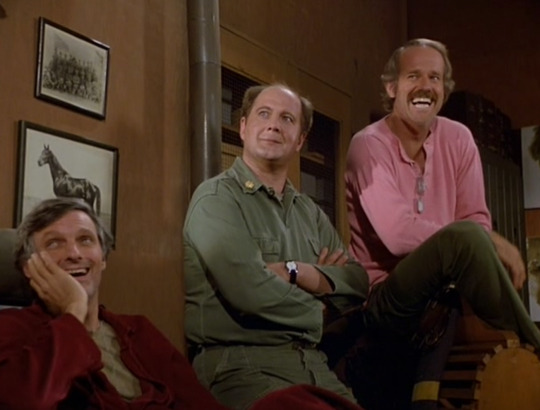

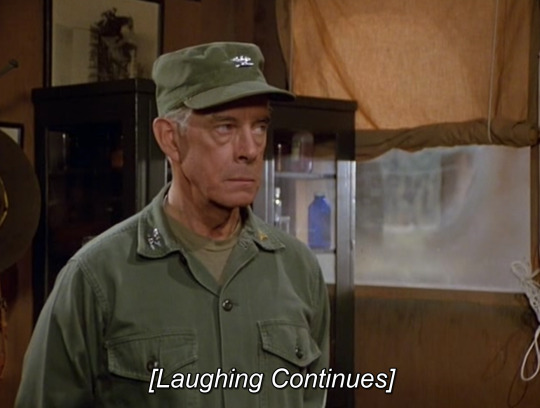
4K notes
·
View notes
Text
It really is remarkable how MASH's longevity so totally shapes the experience of watching the show. It's a war that lasts three years, over a decade has passed, everyone's hair has gone grey, the head nurse has become a different person, the wisecracker has cracked, children grow up, marriages come and go, people leave, the new guy is only there for a year, he's become a part of your soul, it's winter again and again and again and again.
I genuinely don't think there's a better way to imitate how an experience like that can so completely change people. No TV program can capture the intensity of bonds forged through three years in a warzone, but by continuing for eleven seasons the fans are able to still develop that level of attachment to the people of the 4077th.
There's a scene where Hawkeye tries to commiserate with BJ about missing the folks back home, and BJ says that Hawkeye's dad will be the same as he always was but BJ missed out on Erin's development in a way he'll never get back. Now I love this interaction, but I think BJ is forgetting that the people they left behind aren't the only ones changing.
Compare Hawkeye in the pilot to him in the finale, do you really think his father will recognize him? They're both adults, it's only been three years, it shouldn't be that different; and yet Hawkeye's hair is grey and his eyes have lost their spark. You couldn't get that in three seasons of TV. Even if they'd tried, it wouldn't have felt as genuine and organic to the viewers because we wouldn't have gotten to really feel that gradual shift in Hawkeye's persona. It's not just about the writers planning out arcs for the characters, it's about the series itself developing over time.
2K notes
·
View notes
Text
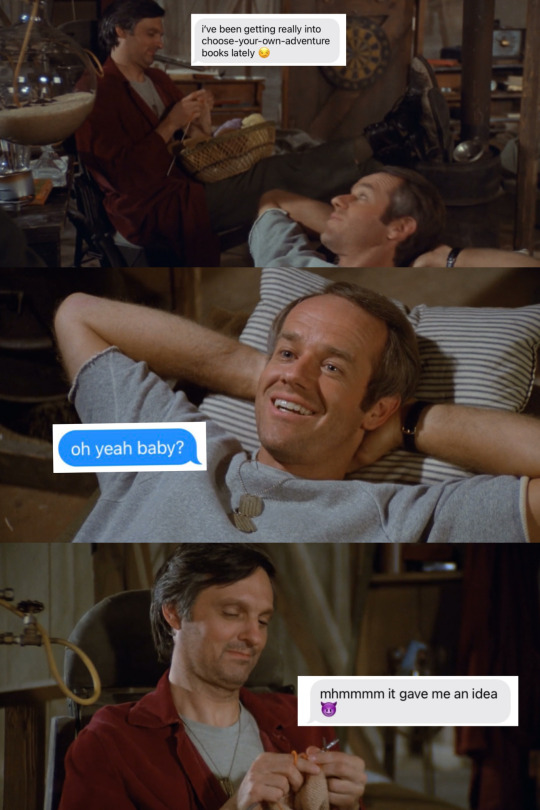

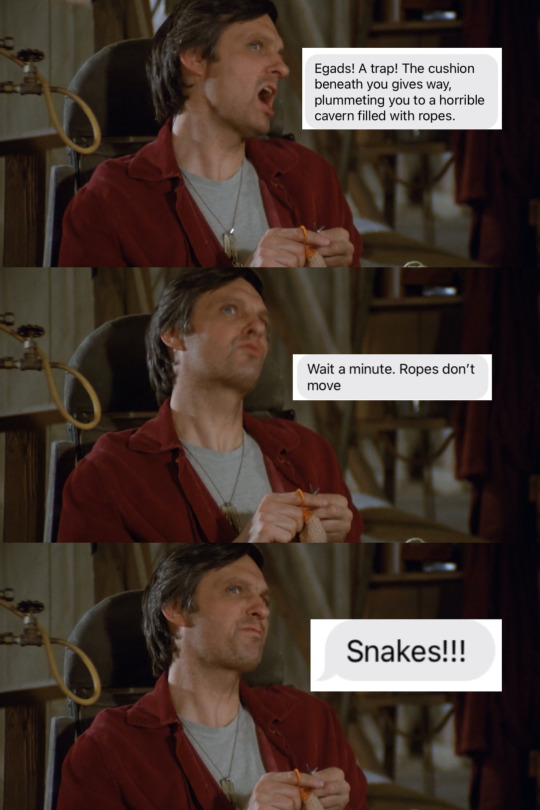
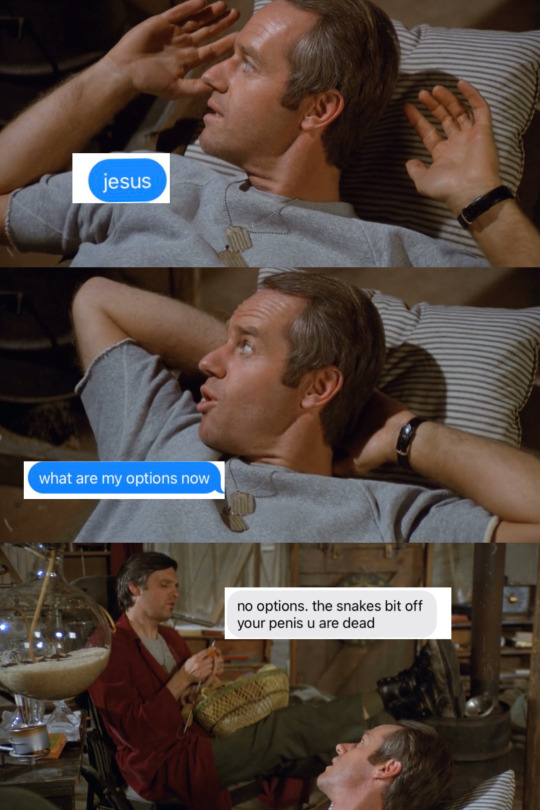

saw this twt post and had an epiphany
#mash#mashposting#mash 4077#hawkeye pierce#bj hunnicutt#hunnihawk#beejhawk#og#shows#70s#shitpost#the way i read this precisely in their voice the first time i saw it#fyi works wondrously the other way around too#also#sorry for the wonky format idk how you do long posts
3K notes
·
View notes
Text








hawkeye & trapper's four (4) goodbyes
974 notes
·
View notes
Text
really funny to me that alan alda could have received any normal actor typecast and what he ended up getting was moral and introspective whore
#'we wanted him bc he was flamboyant and pretty' you wanted him so you could take his clothes off and give him insane readings on life#<<<<< TAGS#alan alda#mash
43 notes
·
View notes
Text
Swamp rats as barking, snarling, growling dogs compilation
679 notes
·
View notes
Text
the topic is Trapper and the army as foils, you have three hours, go
In no small part the satire of Mash, particularly in the first half of the show, is tied up with gender performance.
The army represents traditional, stifling and violent masculinity. This is shown through everything from freudian jokes about guns (eg Frank and Margaret's flirtations in The Sniper or The Gun), to Margaret trying to cajole Hawkeye into performing a more traditional standard of masculinity while treating him like a soldier in Comrades in Arms Part 2, to many jokes and comments about (usually) Hawkeye not being a real man in contrast to army standards and various specific army personnel (eg Lyle in Springtime, Flagg in White Gold), to Frank and Margaret's worship of the masculinity of the army ("He's twice the man you'll ever be," re: Flagg and Hawkeye, Margaret's lust for MacArthur, Frank pursuing the sniper in The Sniper in an attempt to be a "real man" in Margaret's eyes, etc) to many jokes positioning the military as a sexually aggressive man pursuing Hawkeye ("Sure, the sun the moon the stars, your high school letterman jacket. Same deal I promised nurse Baker." "A receipt please, and promise you'll go out with other doctors," etc.)
In contrast, the main characters all fail to perform traditional gender in some way, from crossdressing to immaturity to indecisiveness to peacefulness to Margaret's masculinity and Frank's pathetic failure to live up to his own masculine ideals, to just about everything about Hawkeye. His cowardliness, his jokes about not being a real man, his jokes about taking the feminine role in sexual encounters with men and women, even multiple double entendres about his average at best penis size.
Trapper is the most traditionally masculine of the main cast. He still subverts masculinity in some subtle ways here and there, such as the occasional feminizing joke and mentions of not being in great shape, but overall he's the more butch counterpart to Hawkeye's fem. He plays the role of boxer while Hawkeye plays the role of diva in their respective manager/star roleplaying episodes. He's broader and buffer and plays football, often seen playing catch with someone while walking around the compound, while Hawkeye disdains sports and doesn't participate. He reads Field and Stream which Hawkeye derides in Alcoholics Unanimous while making a wry comment about shaving his armpits. A past lover nicknamed him Big John.
And there are many, many jokes about Hawkeye and Trapper being sexual partners. The recurring Uncle Trapper and Aunt Hawkeye gag, if my father sees this you'll have to marry me, for me? only if you put those on, your father and I will tell you what we did to have you, that's when I fell in love with him, etc etc etc. It's constant. In these jokes Hawkeye usually takes the feminine role, though not strictly every time ("Me and the missus," is one exception in As You Were, the dance in Yankee Doodle Doctor is another).
Trapper's masculinity is differentiated from traditional military masculinity in a few ways. Most obviously, Trapper abhors the military's violence. He never uses guns and mocks Frank's obsession with them, he's a healer rather than a soldier, and he's disgusted by the results of military violence on the men on his operating table.
He's also secure in himself. The military's brand of masculinity is strongly characterized by insecurity and overcompensation. Frank is the main representative of this military insecurity - a coward who insists he's brave (The Army Navy Game), a man who clings to a phallic gun to compensate for his sexual and gendered inadequacies (a main theme of The Sniper, perfectly mirrored when the army itself comes in with a vastly disproprotionately powerful automatic machine gun on a helicopter to shoot down one sixteen year old), a homophobe repressing his own attraction to men (As You Were, the original script of George), etc. We also see this in Flagg, who implicitly sublimates sexual urges into violence (seen when he suggestively caresses his gun while describing how he wants to torture a boy in Officer of the Day).
Trapper doesn't need to overcompensate. He's well-endowed physically, he's portrayed as a competent and considerate lover, he's a brave man who doesn't mind being seen as a coward, and he may or may not be attracted to men but either way he's not a homophobe (George) and he doesn't express his sexuality through violence. When Margaret proves herself stronger than him, his response is to be impressed rather than offended (Bombed). When he dances with Hawkeye for a gag, he doesn't mind letting Hawkeye lead.
He's also differentiated in terms of tradition, with the mliitary representing a more propagandic 50s traditionalism, and Trapper representing a 70s, countercultural freedom from tradition. We see this in the way Trapper has plenty of sex despite being married, while adultery is a court-martial offense in the military. It's notable that he's open and carefree about it, while Frank and Margaret are surreptitious and hypocritical in their affair. This lack of traditionalism is also shown in his disrespect for authority, often in direct contrast to Frank and Margaret's worship of it, and his allyship to George who the military would persecute for his sexuality.
So ultimately we can see that while Trapper and the military are both examples of masculine performance, Trapper's masculinity differs from the military's in being more flexible, less violent, less traditional, and more secure. The military's masculinity is far more toxic than Trapper's, particularly in the context of 70s counterculture media, which aligns womanizing with sexual liberation rather than a lack of respect for women, accurately or not.
This contributes to their respective dynamics with Hawkeye.
Hawkeye, we've established, is usually more feminine, and there are a myriad of jokes characterizing Trapper as his sexual partner, as well as the military as a sexual pursuer.
The jokes Hawkeye and Trapper make about their relationship tend towards cozy domesticity. They're Radar's "aunt and uncle," they directly roleplay marriage ("Martha, we're going to have to move, the people upstairs are impossible,") and less directly behave as though married (the bickering in Alcoholics Unanimous, the discussion about naming their pony in Life With Father). Occasionally they're treated as a healthy couple in contrast to Frank and Margaret's toxicity ("While I'm gone, promise you'll go out with other doctors," vs "Touch anyone else and I'll cut off your hands" in Aid Station).
In some instances the jokes lean towards predatory - "If you're trying to get me drunk, it'll work," or "Who is this man in bed with me?" "I followed you home from the movies," but they're always playful, always fond. If Hawkeye takes on a submissive or victimized role in these jokes, it's one he has fun with and discards just as easily in the context of the rest of his relationship with Trapper.
So, it's important to note that Hawkeye and Trapper support each other and look after each other in an equal, enthusiastic friendship. From Trapper ensuring Hawkeye gets to sleep in Doctor Pierce and Mr. Hyde, to Hawkeye supporting Trapper when he wants to adopt a child, to Trapper right at Hawkeye's side as they attempt to procure an incubator, they are there for each other every step of the way. If their relationship is a marriage in some ways, it's a healthy, strong, and non-traditional marriage, an equal and open partnership free of jealousy and insecurities.
Compare that to the military's relationship with Hawkeye. In jokes it's characterized as powerful and predatory, far from an equal partnership. Sometimes it approaches positive - in Carry on Hawkeye, much of the humour is derived from Hawkeye and Margaret's gendered role reversal as she assumes military command of the unit. Hawkeye playfully calls her sir, seductively lies on her desk like a secretary in a porn film, and most notably treats an immunization shot as sexual penetration in a prolonged gag about sexual role reversal. Hawkeye has fun playing a sexually submissive role to a representative of military authority in this episode, but it is a submissive role.
Several of the one-off jokes have a similar sensibility, such as the double entendre of "My bellybutton's been puckering and unpuckering all day," in response to a representative of MacArthur assuming their excitement over the general's arrival to the unit, or Hawkeye's "Okay, take me, I'm yours," to Colonel Flagg. They demonstrate a willingness to play the receptive role on Hawkeye's part, but they also, pointedly, disturb the object of the jokes.
When Hawkeye makes these jokes that sexualize military authority, he's attempting to be provocative as well as defiantly drawing disruptive attention to his own powerlessness as a drafted surgeon. The power dynamic between Hawkeye and the authority of the military only goes one way, and Hawkeye gets a kick out of pointing it out in ways that perturb the representatives of that authority, but it's a power dynamic that takes its toll on him.
Many of Mash's plotlines revolve around Hawkeye rebelling and attempting to seize some scrap of agency back from the military. Adam's Ribs, for example, in which he starts a mild riot over the food he's being fed and spends the episode attempting to procure barbecue ribs from Chicago (which Trapper procures for him), or Back Pay where he tries to charge the military for his forced labour. A particularly notable example is Some 38th Parallels, in which Hawkeye complains about being paid the equivalent of a nickel per operation, and his frustration manifests in impotency until he can perform a gesture of rebellion against the military.
One unfortunate consistency of these episodes is that the army ultimately retains its power. When Hawkeye achieves his goals, it's only in small ways that do little more than satisfy his own need to assert his sense of self. Often, Hawkeye doesn't achieve his goal at all, but is thwarted by the army, such as in For Want of a Boot. In every instance he remains powerless in comparison to the authority of the military.
So the context in which Hawkeye makes these sexualized jokes about the military literally fucking him is one of abject helplessness. In a sense, all he's capable of is pointing out what the military is doing and putting it in his own, audacious terms. He's not capable of preventing it. His jokes usually have an edge of bitterness to them in delivery, and when they don't, that tone is imparted anyway by the greater context.
With Trapper, Hawkeye can play-act a marriage or an assault, but in either case he's an enthusiastically consenting, equal partner. Trapper's performance of masculinity allows for Hawkeye to take any role from victim to wife to husband, and enables Trapper to respond in kind from a position of equality and respect. The military, in its insecure, domineering performance of masculinity, is a dictatorial authority, never allowing Hawkeye perform any role but a feminized, victimized one, and only ever giving him the choice of whether to perform with a wry smile or a sneer.
In short, Trapper is the cool, considerate service top to the military's insecure domineering boyfriend.
I'm tagging everyone who enabled this lol, share the blame. @beansterpie @majorbaby @professormcguire @rescue-ram
428 notes
·
View notes
